Check out this article in today’s Wired News discussing what Amazon might be up to with features like Search Inside the Book, automated recommendations, and user-augmented content such as reader reviews, customer images, Listmania etc. Are these just a bunch of fun toys, or is it all beginning to add up into something big? The article focuses primarily on fancy new search functions – Statistically Improbable Phrases (SIPs), text stats, and concordance (see “amazon: inching toward semantic“) – and includes a few remarks on the subject from if:book..
Monthly Archives: May 2005
your news, your pictures
 “If you find yourself in the right place at the right time, if an event is unfolding before your eyes and you capture it on a camera or mobile phone, either as a photograph or video, then please send it to BBC News.”
“If you find yourself in the right place at the right time, if an event is unfolding before your eyes and you capture it on a camera or mobile phone, either as a photograph or video, then please send it to BBC News.”
The BBC has just made a bold move into user-generated, or rather user-augmented, news. If anyone thinks that a community-built media is only being explored on a smaller, local scale (see here and here), then think again. The world is in a frenzied state of self-documentation – laying down a vast mosaic of images, video, graphics and text on top of every inch of reality. If the mainstream media is to keep up, it will have to a certain extent “employ” everyone as stringers. To put a slight spin on Shirky‘s formulation: the only group that can record everything is everybody.
(image: Andrew Vorobyov’s photo of the “orange revolution” in Ukraine)
poor circulation
Newspapers continue their slide.. From an article in WSJ (a rare free feature):
“Rather than simply trying to halt the decline, which can be done readily through discounts and promotions, they’re being forced to try to “manage” their circulation in new ways. Some publishers are deliberately cutting circulation in the hope of selling advertisers on the quality of their subscribers. Others are expanding into new markets to make up for losses in their core markets. Some are switching to a tabloid format or giving away papers to try to attract younger readers. Others are pouring money into television and radio advertising and expensive face-to-face sales pitches to potential subscribers.”
You’d think some of this desperate energy could be channeled into making newspapers live more fully on the web.
blogging into books

![]() “Baghdad Burning” collects roughly a year’s worth of posts from the blogger known as Riverbend, the 25-year-old Iraqi woman who has been electrifying western readers with her regular reports from the tumultuous heart of the American occupation. But do blogs necessarily stack up as books? Conversational Reading points to a San Francisco Chronicle review that says they don’t, just as binding a stack of news articles does not make a coherent work of history: “‘Baghdad Burning’ fails because the characters and anecdotes are too varied to establish a compelling narrative.” Riverbend may very well have a good book to write, but “Baghdad Burning” just seems like slick packaging, reminding us that a book is much more than just a vessel. As a blog, Riverbend soars. As a book, it clatters around like nuts and bolts.
“Baghdad Burning” collects roughly a year’s worth of posts from the blogger known as Riverbend, the 25-year-old Iraqi woman who has been electrifying western readers with her regular reports from the tumultuous heart of the American occupation. But do blogs necessarily stack up as books? Conversational Reading points to a San Francisco Chronicle review that says they don’t, just as binding a stack of news articles does not make a coherent work of history: “‘Baghdad Burning’ fails because the characters and anecdotes are too varied to establish a compelling narrative.” Riverbend may very well have a good book to write, but “Baghdad Burning” just seems like slick packaging, reminding us that a book is much more than just a vessel. As a blog, Riverbend soars. As a book, it clatters around like nuts and bolts.
all the news that’s fit to list
Google has patented a system that will rank news search results by quality and credibility, instead of simply by date and relevance to keywords. See article “Google searches for quality not quantity” in NewScientist. This recalls questions recently raised by Kim in “is the information any good?…don’t ask Google.”
People have a hard time agreeing on which news is credible, but I’m hesitant to believe that machines and algorithms can do better. I worry that smaller or alternative sources will get unfairly buried in the listings. Perhaps they should try ranking for neutrality…
